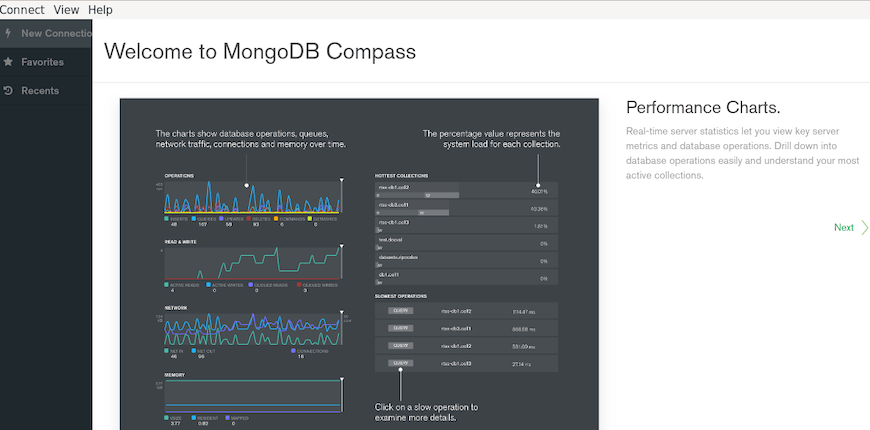How To Install MongoDB Compass on Debian 12

MongoDB Compass is a powerful graphical user interface designed to simplify database management for MongoDB users. As an intuitive and feature-rich tool, MongoDB Compass allows developers and database administrators to efficiently interact with their MongoDB databases, perform queries, and visualize data without the need for extensive command-line expertise. By providing a user-friendly interface, MongoDB Compass streamlines the process of exploring and manipulating data, making it an essential tool for anyone working with MongoDB.
In this comprehensive guide, we will walk you through the step-by-step process of installing MongoDB Compass on Debian 12, also known as “Bookworm.” Whether you’re a seasoned Linux user or new to the world of MongoDB, this article will provide you with the necessary knowledge and instructions to get MongoDB Compass up and running on your Debian 12 system.
Prerequisites
System Requirements
Before proceeding with the installation of MongoDB Compass, it’s crucial to ensure that your system meets the necessary requirements. First and foremost, make sure that you have Debian 12 (Bookworm) installed and fully updated. Debian 12 provides a stable and reliable platform for running MongoDB Compass, guaranteeing optimal performance and compatibility.
Additionally, you’ll need to have sudo privileges on your Debian 12 system to execute the installation commands successfully. If you’re unsure whether you have sudo access, contact your system administrator for assistance.
Software Dependencies
MongoDB Compass relies on certain software packages to function properly. Before installing the application, verify that you have the required dependencies installed on your Debian 12 system. Two essential packages are wget, which allows you to download files from the internet, and dpkg, the package management system for Debian-based distributions.
To check if these packages are already installed, open a terminal and run the following commands:
which wget
which dpkg
If either of these commands returns an empty result, you’ll need to install the missing package using the following command:
sudo apt install wget dpkg
Once you have confirmed that your system meets the requirements and has the necessary dependencies installed, you’re ready to proceed with the installation of MongoDB Compass on Debian 12.
Step-by-Step Installation Guide
1. Update System Packages
Before installing any new software, it’s always a good practice to update your system packages to ensure you have the latest versions and security patches. Updating your packages helps prevent potential compatibility issues and vulnerabilities.
To update your Debian 12 system packages, open a terminal and run the following commands:
sudo apt update
sudo apt upgrade
The apt update command refreshes the package list, fetching the latest package information from the repositories. The apt upgrade command upgrades all the installed packages to their latest available versions.
Depending on the number of packages that need updating, this process may take a few minutes. Once the update is complete, your Debian 12 system will be up to date and ready for the MongoDB Compass installation.
2. Download MongoDB Compass
To download MongoDB Compass, navigate to the official MongoDB website and locate the download section for MongoDB Compass. Look for the Debian package (.deb) that matches your system architecture (usually amd64 for 64-bit systems).
Alternatively, you can use the wget command to download the package directly from the terminal. Open a terminal and run the following command, replacing 1.x.x with the desired version number:
wget https://downloads.mongodb.com/compass/mongodb-compass_1.x.x_amd64.deb
The wget command will download the specified MongoDB Compass package to your current directory. If you encounter any issues during the download, such as a slow or unstable internet connection, you may need to retry the command or download the package manually from the website.
Once the download is complete, you can verify the integrity of the package by comparing the checksum provided on the MongoDB website with the checksum of the downloaded file. This step ensures that the package has been downloaded correctly and has not been tampered with.
3. Install MongoDB Compass
With the MongoDB Compass package downloaded, you can now proceed with the installation. In the terminal, navigate to the directory where you downloaded the .deb package and run the following command:
sudo dpkg -i mongodb-compass_1.x.x_amd64.deb
Replace 1.x.x with the actual version number of the downloaded package.
The dpkg command is used to install Debian packages. The -i flag specifies that you want to install the package, followed by the name of the .deb file.
If the installation encounters any dependency issues, you may see an error message indicating that certain packages are missing or not installed. To resolve these issues, run the following command:
sudo apt --fix-broken install
This command will attempt to automatically install any missing dependencies and resolve any conflicts. Once the dependencies are resolved, re-run the MongoDB Compass installation command:
sudo dpkg -i mongodb-compass_1.x.x_amd64.deb
If the installation proceeds without any further issues, MongoDB Compass will be successfully installed on your Debian 12 system.
4. Launch MongoDB Compass
After the installation is complete, you can launch MongoDB Compass from the terminal by running the following command:
mongodb-compass
This command will start the MongoDB Compass application, and you should see the user interface window appear on your screen.
Alternatively, you can access MongoDB Compass from the application menu of your Debian 12 desktop environment. Look for the MongoDB Compass icon in the menu and click on it to launch the application.
Upon launching MongoDB Compass for the first time, you may be prompted to set up some initial preferences, such as the default language and telemetry settings. Follow the on-screen instructions to configure these preferences according to your preferences.

5. Connect to a MongoDB Database
Now that you have MongoDB Compass installed and running, you can connect to a MongoDB database to start exploring and managing your data. MongoDB Compass provides an intuitive interface for establishing connections to both local and remote MongoDB servers.
To connect to a MongoDB database, follow these steps:
- Click on the “New Connection” button in the MongoDB Compass window.
- In the connection dialog, enter the necessary connection details:
- Hostname: The hostname or IP address of the MongoDB server.
- Port: The port number on which the MongoDB server is running (default is 27017).
- Authentication: If your MongoDB server requires authentication, select the appropriate authentication mechanism and provide the necessary credentials (username and password).
- SSL/TLS: If your MongoDB server uses SSL/TLS encryption, enable the SSL/TLS option and provide the required certificates.
- Click on the “Connect” button to establish the connection.
If the connection is successful, MongoDB Compass will display the databases and collections available on the connected server. You can then use the various features and tools provided by MongoDB Compass to query, visualize, and manage your data.
6. Troubleshooting Common Issues
While installing and using MongoDB Compass on Debian 12 is generally a straightforward process, you may encounter some common issues. Here are a few troubleshooting tips to help you resolve these issues:
- Installation errors: If you encounter errors during the installation process, such as missing dependencies or conflicts, make sure to run the
sudo apt --fix-broken installcommand to resolve these issues. Double-check that you have met all the prerequisites and have the necessary packages installed. - Connection problems: If you’re unable to connect to a MongoDB server using MongoDB Compass, verify that the connection details (hostname, port, authentication) are correct. Ensure that the MongoDB server is running and accessible from your Debian 12 system. Check the MongoDB server logs for any error messages or indications of issues.
- Permissions issues: If you encounter permission-related errors while running MongoDB Compass, ensure that you have the necessary permissions to access the MongoDB server and databases. Review the MongoDB server configuration and user roles to ensure that your user has the required privileges.
- Compatibility issues: Make sure that the version of MongoDB Compass you installed is compatible with the version of MongoDB server you are using. Refer to the MongoDB Compass documentation for version compatibility information.
Congratulations! You have successfully installed MongoDB Compass. Thanks for using this tutorial for installing the latest version of the MongoDB Compass graphical tool for managing your MongoDB databases on the Debian 12 system. For additional help or useful information, we recommend you check the official MongoDB website.